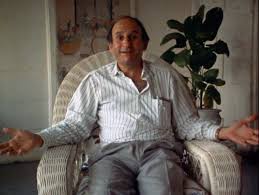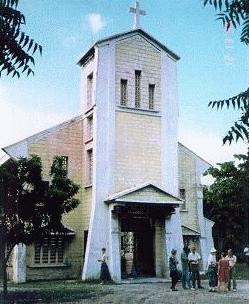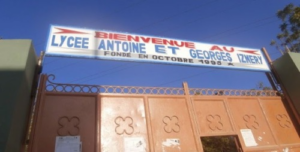Antoine and Georges Izméry were Palestinian-Haitian brothers who were assassinated within a year of each other by the Haitian coup regime that dominated Haiti from 1991-1994. Antoine was a prominent supporter of Jean-Bertrand Aristide, president of Haiti’s first democratically-elected government following the historic Dec. 16, 1990 elections. President Aristide was overthrown by a military coup just seven months after he came to power. From September 1991 to October 1994, Haiti was ruled by a brutal military junta headed by General Raoul Cedras.

Antoine Izméry was an outspoken critic of the coup regime. He advocated for the return of the exiled President Aristide and he criticized the US role in promoting the coup. His brother, Georges, was murdered in May 1992 by a paramilitary death squad associated with the regime.
In the eulogy for his brother, Antoine said “Today, in Georges’ name, I speak for all the people who have disappeared: underprivileged, students, journalists, peasants,workers and peaceful citizens. To understand this hideous crime, beyond pain and emotion, it must be understood that they want to transform Haiti into a vast prison and an immense cemetery.” Antoine Izméry subsequently lodged a complaint with the Inter-American Commission on Human Rights over Georges’ death, which sparked a sharply critical resolution from the commission.
On September 11, 1993, Antoine himself was assassinated in broad daylight by 10 armed men tied to Haiti’s military and police. He was dragged from a memorial church service honoring victims of the 1988 St. Jean Bosco massacre, forced to kneel in the street, and shot point blank in the head despite the presence of domestic and international human rights observers and the press. An international UN investigation later concluded that the elaborate plan to assassinate Antoine Izméry could not have been carried out without the complicity, if not the participation, of highly placed members of the Haitian armed forces. That same military, along with a new group of death squads, has been resurrected today in Haiti, and continues to terrorize the population.
Haiti Action Committee is honored to post this powerful eulogy given by Antoine Izméry in 1992 for his younger brother. We salute and remember Antoine and Georges Izméry for their dedication to justice and social change in Haiti and their love for their fellow human beings. Today, in yet another period of horrific state-sponsored terror in Haiti, the example of the Izméry brothers continues to resonate.
∗Eulogy for Georges Izméry∗
Circumstances of the death of my brother… On May 30, Georges would have been 46. He didn’t celebrate with us, his family, his relatives, his friends. He is dead. Assassinated by three bullets. One near his right shoulder, two in the back. Killed by a coward. He, a peaceful citizen who respected God, loved his family, honestly earned his living by his work and shared the fruits of his labor with others, especially the poorest people of this society. Georges died, assassinated, Thursday May 26 around 6 pm, a stone’s throw away from our store, situated on the Boulevard Jean Jacques Dessalines, not far from the Cafeteria police station.
Police officers from the Cafeteria, situated near to the scene of the crime, didn’t arrive until after protection was given to the cowards who committed the murder. Members of my family were not authorized to transport my brother to the hospital to get care for him. The police took it upon themselves to move him and brought him in a police wagon directly to the General Hospital morgue. Everyone has heard what the doctors said: No one was allowed to go near him: neither his relatives to see him, nor a doctor they sent to examine him. If his name were not Izméry, they would no doubt have registered him as “unknown.” That’s what had been written on his record when he arrived at the hospital.
We would have looked for him everywhere in vain and he would not have been recovered, like so many others in the mass graves of Titanyen. I am not exaggerating when I say this. I am simply denouncing the hideous practice, reintroduced in to Haiti since the coup d’etat, of shooting down citizens night and day, disposing of their bodies as though after an epidemic, to erase all traces of their existence, to deprive them of all respect, even after death. Today, in George’s name, I speak for all the people who have disappeared: underprivileged, students, journalists, peasants, workers and peaceful citizens.
To understand this hideous crime, beyond pain and emotion, it must be understood that they want to transform Haiti into a vast prison and an immense cemetery. Do you remember that yesterday, with Jean Marie Montes, a trade unionist, it was Serge Villard, advisor to the government and a man of integrity. Today it is Georges, a well-known businessman. Tomorrow who will it be? Who next? Do not think that you are safe. The criminals have struck down someone well known, of good heart, rich, and whose fortune is based on hard work. Nevertheless, every day gratuitous murders are committed in the country.
Since September 30, the Army has renewed its former behavior. It believes itself to be once again the master of lives and of goods. It kills today as it killed Jean-Robert Cius, Daniel Israel, Mackinson Michel in Gonaives, Roseline Vaval in Petit- Goave, Christophe Charnel in Cap-Haitien, Duny Despestre in Port-au-Prince, without counting the others: Yves Volel, Lafontant Joseph, Gregory Delpe and thousands of anonymous people in Cite Soleil, San-Fil, Martissant, St. Martin, Bolosse, Carrefour, Cap, Cayes, Jeremie, Port-de-Paix.
Every morning the sun rises on a cortege of cadavers in the streets. Georges was disgusted by it. In the midst of work, he couldn’t keep from letting his anger out over such cowardice. Since May 15th, some 300 cadavers have passed through the morgue of the General Hospital. Every evening brings gun fire, robberies, rapes, and fear in the homes, especially in working class neighborhoods, privileged targets of the soldiers. Every honest person must reproach this intolerable situation or wait one day to be the next victim.
There is still time. Rise up and make your voice heard for your own survival. The murder of Georges is a revolting and sordid crime committed against a merchant who peacefully attended to his own business. It is a gratuitous murder, perpetrated against someone of whom nobody could naively say, “He asked for it.”
But there is also the non-assistance of a person in danger. Soldiers did not help Georges Izméry. Worse, when they finally got to the scene of the crime, they forbade and prevented any help. At the moment of the crime a police wagon was waiting nearby. Simple coincidence? Bizarre coincidence? Instead of an ambulance, the police wagon took away the body. Thus, not only do soldiers kill, but they want to be assured that, their deed accomplished, death follows. The non-assistance of a person in danger is just as ignoble a crime as murder itself. It is a crime punishable by the law. A soldier who orders his subordinates to act in this manner shows that, in this army, there is neither ”moderation” nor “respect for life” as some would want us to believe–whether general or captain, sergeant or simple soldier.
To the suffering of the relatives they add an undue pressure: the threat to make them know the same fate as the victim. What are they looking for? To make everyone know that they have the right of life and death over them, as in the darkest days of Francois Duvalier! Put another way, they impose upon us with their arms a war to force us to recognize their supremacy. These heirs, these macoutes, don’t want to become unworthy of their “spiritual father.” They must find us facing them, decided to win the battle for democracy. Our rejection of duvalierism, of its doctrine and its fascist practices is total and definitive. There will be no possible compromise with those who want to make us submit by force of arms. It is them or us. As much as they will use violence, it will always be them against us and us without them. Makout pe ladann (macoutes fear involvement).
Georges Izméry and the social question. We must also ask ourselves whether Georges Izméry was really the target they intended to kill. To this question I reply without hesitating that, in his way, Georges was a fighter. He did not accept the sordid and inhuman conditions in which his fellow citizens wasted away. Georges knew La Saline, Cite Soleil and all the working class neighborhoods without water, sewers, electricity, work or hope for a better future than what the inhabitants could forge for themselves. Georges expressed his solidarity in sharing a part of his wealth with the poorest of our society. He knew how to extend a helping hand to all. He also helped finance ecclesiastical, social and community projects. He shared not to show off the wealth he had earned by his work, but to redistribute a part of it to the community and to his fellow citizens as his heart told him to do. It was his way to respond to the problems of a great number of underprivileged in Haiti.
Georges and I shared the same values, the same choices and the same objectives. We had complete confidence in one another. His murder confirms. if it needed to be, the degradation of moral values in Haiti. We live in a society where life is no longer respected. They kill as if for pleasure. They torture innocent people in a sadistic manner. Even the dead aren’t respected; they are buried in shallow graves and the dogs share the remains. Let us not close our eyes. Otherwise we would risk, in turn, coveting other people’s money and trying to acquire it by theft. Let us not close our consciousness to the cries of peasants because we, in turn, will seek to dispossess them of their land.
Our children and all the youth of Haiti expect from us a new society marked by the seal of truth; they expect to be done with the reign of

institutionalized lies. A joyous society where the values of compassion, fraternity, love and respect for all will be substituted for injustice, violence, hatred and intolerance. A small group without moral values rendered possible the fire in Saint John Bosco and the murder of the faithful assembled to pray to God. It rendered possible the stabbing of the little girl, Esperancia, in her mother’s womb before her birth. It rendered possible the fire in Lafanmi Selavi (orphanage) where cowards caused the deaths of four children in their sleep.
Georges is dead, and so many others too, victims of this little group without scruples or any sense of moral values. That Georges’ death be a key event for the new beginning and the definitive transformation sought by the people. That Georges’ death give courage to continue the struggle and the reason we will win.
Many people ask themselves with reason if there was a mistake about the person. They believe that the one they want to eliminate at any price is me, Antoine Izméry. And they advance four reasons as proof:
a) My strong political opinions: I don’t make any concessions to the putschists, to the corrupt and to their buddies, the dealers in contraband. And I agitate for the return of Aristide to his country and his functions.
b) My incessant struggle against the dealers in contraband that makes me seem like a hindrance to getting rich fraudulently. Yet, behind every deal in contraband is usually a military thug, high ranking, naturally.
c) The action that Georges and I just broached against the Banque de l’Union Haitienne (B.U.H.) We were attempting to gather enough shareholders to convoke an extraordinary assembly with the purpose of examining the politics of B.U.H. loans, the repeated internal embezzlement and the kind of financing of putschists they operate. Thus, certain financial operations would be directly linked to the present political situation. (Note: the B.U.H. is controlled by the Brandt family).
d) My decisive criticism of U.S. policy vis-a-vis Haiti, which
disturbed American diplomatic personnel. I have my opinions on
the Americans and their participation in the coup d’etat of
September 1991 and I have stated them publicly. I denounce the
bad signals sent to the putschists every time a breach is opened in
the embargo either by the U.S. itself or by their inaction….. This
struggle would irritate the military either because of the
contesting of their usurped power, their assassinations or the
restraints placed on their illicit enrichment. I will be to them a
man to slaughter. Georges has fallen, perhaps in my place. And
whatever error there may be, this will prove only one thing: that
all of us present in this Cathedral or elsewhere are in danger of
death.
For the moment, I am alive and I do not at all have the intention of
making my political testament here. But I must tell you that my
life is a quest for justice and for social change in Haiti. For me,
the first objective of justice is the right to life, protected and
guaranteed by a government conscious of the claims of all our
people. I will not change. I will always remain a political fighter.
To our Haitian friends, I will permit myself to say that the struggle for the triumph of justice will be long and bloody. But liberty is not given, it is taken. And for one who falls, 10, 100, 1000 will follow. Yes, the people of Haiti are hungry and thirsty for justice. It began on February 7, 1986. It will not stop until the objectives have been attained: a more humane, just, truthful and joyous society, a society where all are respected, kote tout moun se moun.

To my foreign friends I will say this, I am not looking for death. But I am not afraid of death. Life is not the most precious good to humanity. There are conditions that can render life itself odious. To know that one is governed by assassins or by a band of organized criminals such as the mafia…. To live under terror, to be deprived of ones fundamental liberties, to see oneself robbed of the result of a vote freely and democratically expressed, to not have the means to decent housing for oneself, to nourish oneself comfortably, to be cared for, to send ones children to school, to be tortured or imprisoned in a degrading way: here are some of the conditions that render life odious. The Haitian people will always find me on their side and on the side of our freely elected leaders in our march toward life and in our combat against death.
All of you who have come to pay respects to Georges, who have brought comfort to our family and myself, I salute you with respect, honor and dignity. Georges is no more! He bequeaths to us the terrain of social change and love for fellow beings. In this sense, he is not dead. He lives in our projects and in what we do so that never, never again in Haiti will people be brought to say as in ’Les Gouverneurs de la Rosee’: “We all are dying.”
So, like all fighters and all social reformers, Georges Izméry will always be present among us.
[from Haiti: Resistance & Democracy. Bulletin #111 by Haiti Communications Project]